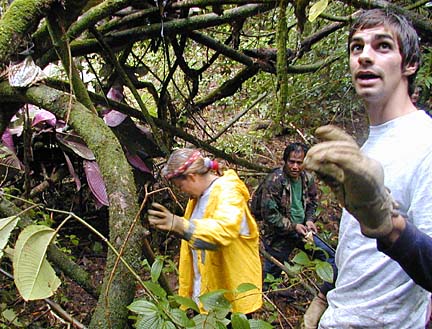


|
Satisfying work Despite slogging through mud and rain, hacking through dense brush and fending off mosquitoes in the Nuuanu forest, Steve Seiler was happy to have a job.
State jobs battling miconia help
some unemployed get back on their feetBy Leila Fujimori
lfujimori@starbulletin.com"The act of actually removing weeds is not wonderful, but eradicating the weeds to promote the growth of native plants is exciting," said Seiler, who has a background in plant science, landscape architecture and environmental planning.
The former assistant director of the Natural Tropical Botanical Garden on Kauai had been managing a Korean restaurant full-time before Sept. 11.
"Business slowed down tremendously," said the 49-year-old. "My hours were cut to the point where I couldn't make enough money to live on."
Seiler had been looking for a job in conservation, but said, "typically those jobs are few and far between."
But on Dec. 17, Seiler got a 40-hour-a-week three-month job with the state. He's taking forest resource management courses with the U.S. Forest Service via the Internet and hopes to get a position with the state or federal government.
He was one of three emergency environmental workers clearing the alien plant miconia on Friday. Miconia crowds out native species and wipes out native forests. The trio works with the Oahu Invasive Species Committee.

|
After Sept. 11, the state of Hawaii opened up 227 environmental jobs and have filled almost all positions on the main islands except Niihau. The new jobs were part of a state effort to offset the number of people filing unemployment claims after the terrorist attacks. As of last Thursday, 51,714 people had filed claims since Sept. 11.Although Oahu has the most unemployed, it has the fewest positions, with the Big Island offering the most because of the greater degree of environmental problems.
The work ranges from informing residents of how to prevent dengue fever to coqui frog and miconia eradication.
The workers come from a vast array of occupations, including displaced hotel workers, bartenders, secretaries, dishwashers, fishermen and carpenters.
But with more than 100 applicants to choose from, Brent Liesemeyer, Oahu natural area reserves system manager with the state Division of Forestry and Wildlife, selected those best suited for the job.
"We wanted someone who was a good hiker," Liesemeyer said. "I didn't want to take a bunch of hotel workers and ... put people in hazardous situations." The work entails crossing streams, hiking steep gulches and often difficult terrain looking for miconia.
The workers understand the importance of carefully breaking off and bagging clusters of flowers and quarter-inch fruit, each containing up to 200 seeds, as well as placing the leaves and branches above the ground to prevent them from rooting.
But they also appreciated the importance of the work.
"My first kill," said 48-year-old Zena Lyons after cutting down her first miconia tree.
"I'm very grateful for this opportunity," said Lyons, a naturalist and former national parks resource manager. "I'm doing something that I, not like, but love with a passion." Lyons had been unemployed since June.
Ryan Smith, 25, whose girlfriend had gotten a job in Hawaii, had booked a flight from San Francisco to Honolulu on Sept. 11. They made it the following week.
He hoped to at least get a job waiting tables to make ends meet before landing a corporate science position.
"By the time I came, the economy was devastated, I couldn't even go through a temp agency," he said. "It was discouraging looking for work.
With a molecular biology degree, backpacking and environmental work experience on the Big Island, Smith was one of the top candidates for miconia eradication and is at ease in the difficult terrain.
The miconia workers have also been planting native species, removing other invasive plants from different locations and also work in the office.
Smith said he enjoys his work so much he's now looking for field work jobs and hopes to get a permanent job with the Oahu Invasive Species Committee.
Many displaced workers had no background for these new jobs.
Despite that, Renee Edralin said the transition from housekeeping at the Hilton Hawaiian Village to canvassing Windward Oahu neighborhoods sharing information about dengue fever has not been difficult.

|
"I'm used to approaching people at the Hilton," said the 42-year-old. "I have to knock on the door and ask permission to service a room.""I've enjoyed being outside on that side of the island and walking door-to-door talking to people," she said. "We've all enjoyed that."
The dengue fever prevention teams also ask to check for mosquito breeding sites, and many are surprised to learn they have mosquitoes around their houses, Edralin said.
Although a few people have been standoffish, most have been nice, she said. It's their dogs she fears.
However, she is extremely grateful for the job, which came the Friday before Christmas Eve. From October to December, she averaged working one day a month. Her unemployment benefits were $186 a week, considerably less than what she was earning full-time at $12.67 an hour.
"I'm not ashamed I had to get food stamps," she said, but after getting the environmental job, she discontinued them.
Edralin must support a son, 16, and a daughter, 20, in college. Her husband lost his job as a marine technician before Sept. 11 and does temporary warehouse work when he can get it.
She says she hopes her temporary position will extend to six months, but she will continue to work at the Hilton, and the work has picked up recently.
"I'll stick it out with them. I hope things get back to normal," she said.